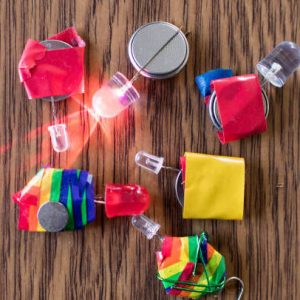Makerspace examined through equity, diversity, inclusion, decolonization, and anti-Racism (EDIDA) frameworks.
- Dates: Virtual: June 19-July 9, 2023 | In-Person: July 10-14, 2023 | Virtual: July 17-23, 2023 (some assigned readings and assignments will be required in advance of the institute).
- Instructor: Dr. Keri Ewart
- Location: Virtual (synchronous and asynchronous) and in-person on the UBC Vancouver campus
- Please note: students must have already completed ETEC 500 to take a MET Summer Institute

21st-century learning means moving beyond the traditional constraints and confinements of a one-sized, teacher-directed curriculum, towards developing a creative, divergent, and rigorous learning environment that is personalized and differentiated. This 21st-century learning environment should engage students through authentic critical challenges and provocations and is the aim of Makerspaces. Through the act of making and tinkering (Graves & Graves, 2017), students are able to engage in real-world applications, relevant to their own lives, in a space that builds innovation, critical thinking, multiliteracies, communication, and collaboration skills through project-based learning.
“The surge of interest in creating physical items with digital tools and internet-shared plans and techniques is known as the maker movement” (Burke, 2014, p. 11) and is a fairly recent phenomenon in education. As Peppler and Bender (2013), explain, “a hallmark of the maker movement is its do-it-yourself (or do-it-with others) mindset that brings together individuals around a range of activities” (p. 23). With the three fundamental elements required for effective maker learning being, the commitment to best-practice and research-supported pedagogy (Barnett, 2020), the commitment to educational technology and meaningful and purposeful non-digital and digital tool implementations (Dousley, 2017), and the development of soft skills and mindset (Rosenheck, 2020), the “maker movement has fundamentally changed the way educators and educational researchers envision teaching and learning” (Halverson & Peppler, 2018). Yet according to Spencer (2017), many educators do not know how to effectively infuse, implement, identify, and design curriculum content through makerspace structures. As well, many educators struggle with ensuring the design and execution of equitable, inclusive, diverse, decolonized, and anti-racist spaces which are culturally relevant, responsive, and sensitive (Kye, 2020).
Grounded in social learning theories, multiliteracies and multimodalities theories, critical race theory, inquiry-based learning, design-based thinking, and 21st-century pedagogies, candidates will learn to merge theory with practice as makers and creators. Through research, design, experimentation, building, and inventing, participants will explore the educational, cultural, and social value of makerspaces. They will delve into the importance of cultivating creative and growth mindsets through maker mentalities and entrepreneurial mindsets to build the knowledge, confidence, and skills to effectively infuse, implement, and assess makerspaces into classrooms. This course explores constructivist and cultural theories in education and digital engagement and their significance in designing dynamic learner-focused environments that support 21st-century modes of making. Candidates will explore the history and design of makerspaces and maker projects and provocations from Equity, Diversity, Inclusion, Decolonization, and Anti-racism (EDIDA) frameworks using no-tech, low-tech, and high-tech tools (Kafai & Jayathirtha, 2020) all through an interactive, inclusive, and technology-supported learning environment.